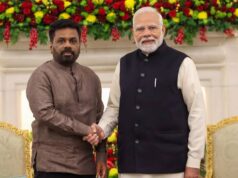The inevitable coming economic warfare requires Australia to plan ahead

By Colonel Awadhesh Kumar, Veteran
QUAD with Australia – India -Japan and USA, was a sound initiative for the Indo Pacific region as it had begun achieving everything desired albeit at a slow pace.
However Biden Ji of USA wanted to turn it into a military bloc to contain China. Biden ji simply forgot that India was neither a Junior Partner or a lackey and naturally USA wish was simply refused to be entertained by India.
In desperation Biden, to embarrass India, out of the blue came up with AUKUS with its lackey the UK. Both lured and arm twisted Australia to join it.
The Australian politicians who signed up for it soon knew that AUKUS was nothing but a huge embarrassment for Australia. Though Australian Government still persists with the burden and only the next generation of political leadership can deal and rectify this huge mistake.
The US had lured Australia into joining AUKUS with promise of Quick supply of nuclear powered attack submarines. Australia got trapped without thinking and even soured it’s relationship with France.
Now most likely USA will just not be in a position to give Virginia-class submarines to Australia. It is already engaged in competition with China in the number of nuclear-powered submarines, and is falling behind.
American shipyards are having acute shortages of skilled labour. In fact the new rising star in manufacturing of nuclear powered submarines and conventional submarines is going to be India.
For Australia, AUKUS has led to losing its sovereign submarine capacity. So before USA says —Sorry no submarines — Australia should start looking towards it’s neighbour India.
Alternative to this will be to permit basing of American nuclear-powered submarines in Australian ports and thereby losing total Sovereignty !!
Many Australians think, and rightly so, that in spite of numerous challenges over the past years, optimism can still be maintained when envisioning the future path of Australia’s relationship with Asian Countries.
The overall relationship between Australia and most of the Asian countries is sound. The consensus view in Australian politics, shared by both the opposition and the government, is that the relationship with Asia is important especially with China, and should be improved, with trade being enhanced.
This is a big change from what the Conservatives were saying when they were in government three years ago. They were all the time saying harsh and hard things.
But they now recognize that Australians want the government to look after not only Australian security but also Australian prosperity by maintaining and expanding trade with economic giants like India and China.
These two countries must become Australia’s biggest markets. USA and Western Europe are no replacement.Though some Australian politicians sound absolutely confused when they say that for Australian exporters, India will not be a “new China.”
Australian trade with China may be growing but the pace has reduced drastically. The Australian idea of shifting to other markets in Asia was very sound, especially after the “Royal Kick “ received from Beijing sometime back.
However other Asian countries, especially rising Global giant star India, are not desperate for trading with Australia. To increase the trade with India, ASEAN and other Asian countries, Australia has to really work hard.
Firstly it has to totally discard its self perceived “ superiority “ without any economic or military basis and accept the ground realities, then only Australia can become natural trading partners with India and other Asian Countries.
Increased trade with India, ASEAN, China and other Asian countries is going to be the biggest factor for Australia in the foreseeable future.
Australia still ” thinks” that it is part of the Western world and looks to the US for security. This thinking needs to change drastically. The very geography places Australia in the increasing Asian sphere of influence.
The West which is declining rapidly will soon be out of reckoning. Presently the Australian political thinking is very different from those of other Asian countries.
There are civilizational differences, but slowly there has been large demographic changes in Australia and this will keep happening.
Naturally trade is the area where these very different countries can do business to mutual advantage.
After taking over the Presidentship the Trump administration will first attempt to contain China or engage in economic warfare with China.
Next there may be economic conflict with India too. Naturally sooner than later it will simply see Australia further explicitly at odds with Washington.
Australia is now committed to the regional trade pact, and Australia along with India, ASEAN and China support the continued work of the WTO.
The US, however, remains hostile – even under Biden, the US has withdrawn and reduced its support.Australia, India and China have even pursued trade in minerals including critical ones, and this has been in Australia’s interest.
In fact in strategic documents, Australia has stated that the era of American primacy in Asia is over – that is, America is no longer able to have its way on every aspect of strategy in Asia.
This is particularly interesting, given that Australia is presently such a strong American ally.Indian economy has been on the rise for quite some time and this has been good not only for the region but also for the most of the World.
This is good for ASEAN, Japan and even Australia. These countries will be exporting more of pulses, exotic fruits, Cheese, wine to Indian supermarkets. It’s also good for exporters of Coal and iron ore to Indian companies.
Increased exports means more revenue flowing into the Australian government’s budget, enabling to do more for health, disability, defence and education.
However the Chinese economy has gone Southwards especially since Covid. Asian countries including India and Australia wish the Chinese economy to recover and resume its growth path.
If it does, China too will import more from the region. That’s why, even though Australia is a strategic partner and an ally of the US, it can not and should not align with Washington in its commitment to contain others through Tariff Warfare, to economically separate China or to engage in damaging economic actions directed at China.
That is absolutely not in Australia’s interest.The only way to lift world economic growth and to roll back extreme poverty is through more trade and more openness, as has been demonstrated again and again.
When the US looks at using tariffs as an instrument of diplomacy, it would be doing so at the cost of American living standards.
America’s middle class needs cheap, competitively priced imports from India, China and ASEAN. It’s the most obvious way to lift their living standards.
Trump is a nationalist and therefore to contain others may resort to trade war. This will lead to both China and India saying similar things about the need to avoid economic warfare and the need to emphasize market access and trade agreements.
Perforce Japan, ASEAN and even Australia will have to join the Chorus. This will lead to strategic difference between Australia and the US on this issue – specifically, the benefits of international economic engagement and the institutional architecture like WTO that supports it.
India and China, along with other WTO members, have worked to set up a dispute resolution arrangement after the US abandoned its support for the appeals body under the WTO. I think we’re going to see more of that cooperation.
Even the Australian trade minister, Don Farrell, described the export controls imposed by the Biden administration on China as draconian.
So, even before Trump, Australia had been taking a critical view of American containment measures directed at China.
India with PM Modi at helm has been increasingly demonstrating that it is a very investable Market. It is ready to work with foreign investors from Europe, America and Australia, who have no political strings attached, to create a range of narratives showing how firms can make profits by investing their shareholders’ money in India.
Even China is with its urbanism, its urban planning and its grand concepts for larger communities serviced by outstanding infrastructure, high-speed rail, good architecture, quality housing and clean air, is trying once again to stem the rapid flow out of foreign investors and companies.
Australia should try its level best to invest in both India and China for better prosperity and regional security.




